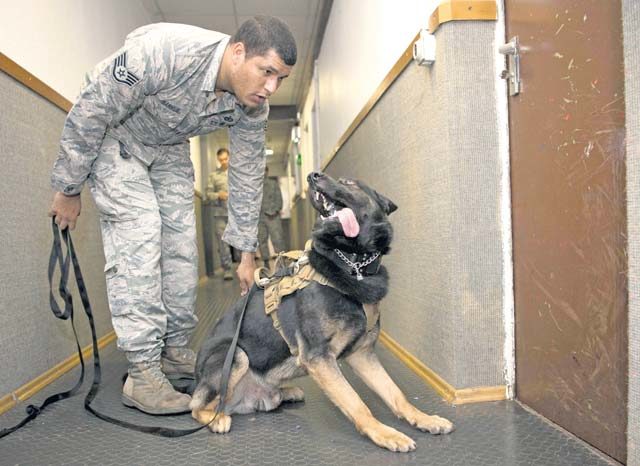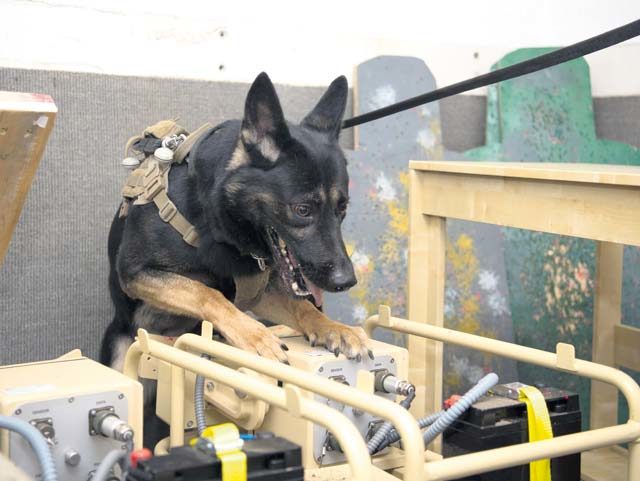
Ramstein welcomed a new canine candidate to its 86th Security Forces Squadron military working dog team. Orca is a two-year-old German shepherd who is currently being evaluated to see if he has what it takes to become a permanent team member at Ramstein.
Not just any dog can work for the U.S. Air Force. MWDs and their handlers stand the ground between a base and outside danger. They must have an incredible bond with their handler to detect explosive threats and protect against physical aggressors before threats turn in to casualties. To become an MWD, a dog has to be extraordinary.
To make the team at Ramstein, Orca must demonstrate his abilities. He is trained to sniff for certain chemicals used in explosives and show Staff Sgt. Steven Barnum, 86th SFS MWD handler, where they are coming from so that 86th SFS personnel can secure the area. He must also be prepared to neutralize aggressors, including individuals running, yelling and wielding deadly weapons.
According to Tech. Sgt. Lance Oaks, 86th SFS kennel master, MWDs are the Air Force’s best explosives assets.
“We look for dogs that have outstanding drives to chase rewards and the willingness to work,” Oaks said. “We need a dog that has a good genetic background and a good drive to perform.”
Before he ever set paw in Germany, Orca had already been extensively vetted. Barnum explained that experts tested and observed the dog for certain characteristics. As a puppy, he proved he was not too timid. He had to be independent and active, not sluggish. He had to be willing to play with humans. Medical tests proved his genetics were solid and early training ensured he knew the basics when he reached Ramstein. It takes an extraordinary dog to do the job, but it also takes an extraordinary handler to shape him. So, Barnum is perfecting that early training to prepare Orca for his test.
Whenever Orca does something correctly, Barnum enthusiastically shouts “Good boy!” and throws him a toy, pets him, and makes sure Orca feels congratulated. Barnum explained that he tries to keep work positive and fun for the animals, and to never push them too hard. The dogs slowly build behaviors by associating correct actions to positive reactions through hundreds of repetitions. Some dogs have the drive to do the work and some, like Barnum’s first dog, just don’t make the cut.
“So far we’re doing well but we still have a lot of work to do,” Barnum said. “Orca needs to work on obedience and patrol work, but when it comes to explosive detection he was great straight out of the box.”
The 86th SFS is not just testing Orca’s ability to do his job, they’re testing his ability to work as a team with Barnum. If Orca passes, he and Barnum will spend 12-hour days together, defending Ramstein. That means they need to have a good dynamic and pairing the two together was no coincidence.
“They decide with the dog’s personality who would make a good handler for the dog,” Barnum said. “They thought we’d be a good team.”
Barnum said some dogs need a gentler handler, and some a more stern one. Orca needs both, matching Barnum’s ability to shift between handling styles. Barnum said Orca is fearless, rarely shies away from anything and has a strong prey drive. He is very motivated to work for the explosive detection reward-toy. Orca is also more interested in detection than patrol work, which happens to be Barnum’s interest as well.
Their bond began, as most relationships do, in Orca’s first days at Ramstein when Barnum let Orca get used to him.
“That’s when a handler starts to see if the dog likes them,” Barnum said. “We can look for small things, like if the dog brings the toy back or takes off running, or if when a handler walks into the kennel, the dog gets excited.”
Over time, Barnum said, their bond will probably strengthen.
“I think he respects me more than when I first got him,” Barnum said. “When I first got him, if he was off the leash and he got the toy, he was gone. He wasn’t coming back. We still haven’t gotten to the level where he’ll bring it back but he’s not going to run away. We’ll get there.”
Barnum said it feels great to see Orca progressing and he is confident Orca will pass his test when the time comes.
“It’s awesome to see him compete with dogs who have been doing this six or seven years and he’s already accomplishing things they are if not surpassing them,” Barnum said. “This is my project. This is my baby. If in nine months he’s horrible at detection, that’s my fault. On the other hand if he’s great, that’s my fault too. That’s one of the things I can stand up and say ‘I did that. I made the dog what it is.’ Everything he is his whole career will come from me because his foundation came from me.”
From his years of experience as kennel master, Oaks believes that MWDs will always be an important asset to the U.S. military.
“There are machines that pick up on different chemical compounds, but their nose is far better than any machinery,” Oaks said. “It’s very hard to stump one of the dogs.”








